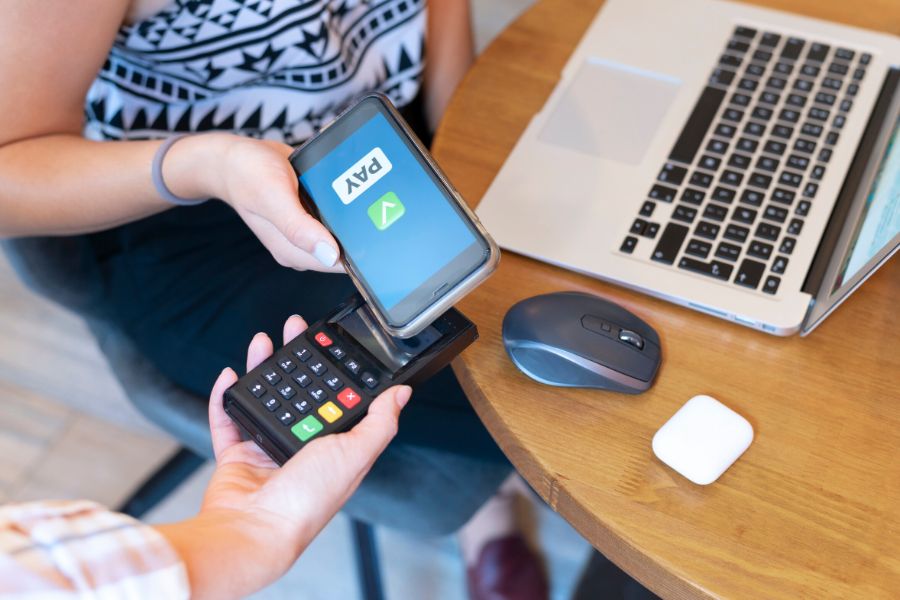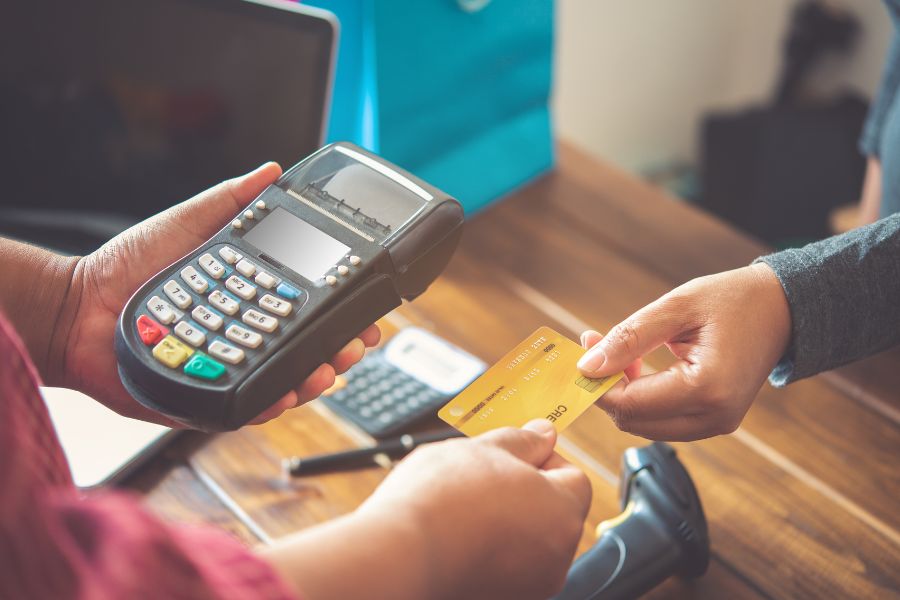As a retailer, you probably already rely on a POS system to manage transactions. But as markets evolve, so do the tools we use. That’s where Cloud POS comes in. But, what is cloud POS? You need to be clear about the technology before considering one to make the most out of it. Basically, this system moves your POS to the cloud, offering more flexibility, real-time access, and the ability to manage your business from anywhere. It’s developed to keep up with the fast-paced retail world and provide the tools you need to stay competitive.
Ready to learn more? Let’s explore what Cloud POS is and how it can benefit your business.
What is Cloud POS?
A Cloud POS (or cloud-based POS) is a modern Point of Sale system that processes payments and stores sales data online, unlike traditional POS systems that rely on local servers or computers.
You can access the system from any device with a web browser, like your PC or laptop (web POS), or through an app on touchscreen devices like iPads or smartphones (mobile POS).
Cloud POS, like ConnectPOS, has become popular due to its flexibility. Owners and staff can manage sales, check inventory, and access real-time data from anywhere, without being tied to a physical location. This is especially useful for businesses with multiple stores, where keeping track of stock can be a major challenge. With a cloud-based system, sales and inventory data sync automatically across locations, reducing errors and making stock management easier.
Another big plus? Cloud POS is lightweight and works with most existing hardware, like printers and cash drawers. It’s also more affordable compared to traditional POS systems, making it a smart choice for businesses that want more flexibility without the hefty setup costs.
Cloud POS vs. Traditional POS
When comparing a Cloud POS to a traditional on-site POS, the differences are clear. Here’s a breakdown of how the two systems measure up:
Setting up
- Cloud POS: Simple to get started. You can sign up online, access the system via a browser, or download the app and start using it immediately.
- Traditional POS: Setup is more complicated, often requiring a technician to install both hardware and software on-site, which can take time and add costs.
Software requirements
- Cloud POS: Typically requires an internet connection to operate but can work offline and sync later. It updates automatically, so you’re always using the latest version.
- Traditional POS: No internet is needed, but it requires a physical server on-site. Software updates must be done manually.
Mobility
- Cloud POS: Works on mobile devices like tablets and smartphones, allowing you to accept payments and manage sales from anywhere.
- Traditional POS: Can’t be used outside the stores where the software is installed. Wireless card terminals connected to the on-site POS can only work within the connectivity range of the system.
Customization
- Cloud POS: Easily integrates with various apps and platforms, offering flexibility and room to grow. Customizations can be added without major disruptions.
- Traditional POS: Customizations are limited and usually have to be done during setup. Updates later can be costly and difficult.
Security
- Cloud POS: Data is securely stored in the cloud, so even if hardware is lost or damaged, your data remains safe. Security patches are handled automatically.
- Traditional POS: Data is stored locally on a server, making it vulnerable if hardware fails or is stolen. You’re responsible for maintaining security updates.
Costs
- Cloud POS: Subscription-based with flexible plans that allow you to scale up or down as needed. This covers customer support, updates, and data hosting.
- Traditional POS: Higher upfront costs for hardware and setup, with ongoing maintenance and long-term contracts making it less flexible.
Quick Comparison Table: Cloud POS vs Traditional POS
| Feature | Cloud POS | Traditional POS |
| Setting Up | Quick online setup, no technician needed. | Requires technician; hardware and software setup. |
| Software | Internet required; automatic updates. | No internet needed; manual updates. |
| Mobility | Works on mobile devices, accessible anywhere. | Limited to store’s network range. |
| Customization | Flexible and integrates with many platforms. | Limited; costly updates after setup. |
| Security | Data stored in the cloud; automatic security updates. | Data stored locally; manual security management. |
| Costs | Subscription-based, flexible, and scalable. | High upfront costs, long-term contracts. |
Who Should Use a Cloud POS System?
Cloud POS is perfect for businesses that need flexibility and real-time control. It’s especially useful for:
- Retailers with Both Online and Physical Stores
For businesses managing inventory across multiple channels, cloud POS helps keep everything in sync. Sales data updates instantly, giving you a clear view of stock levels across all locations. This makes it easier to avoid overselling and manage customer demand more effectively.
- Businesses That Sell at Events or Pop-Up Locations
If you sell outside your main store—whether at markets, events, or pop-up shops—a cloud POS is ideal. It runs on mobile devices, so you can accept payments and track sales on the go, with all data syncing back to your main system in real time.
- Multi-Location Stores
Running multiple stores? Cloud POS lets you manage everything from one system. You can track sales, inventory, and promotions across all locations from a single dashboard, without juggling separate systems for each store.
- Growing Businesses
For businesses planning to expand, cloud POS scales with you. Adding new users, devices, or locations is simple, and you won’t need to overhaul your entire system when your business grows.
- Service-Based Businesses
For salons, spas, and service shops, cloud POS isn’t just for sales. It can manage appointments, track customer preferences, and handle payments, streamlining your daily operations.
Benefits of Operating a Cloud POS System
A Cloud POS system brings a range of advantages that can reshape how businesses manage their operations:
- Instant Access to Data
Cloud POS keeps your sales, inventory, and customer data up to date in real-time. You can track key metrics as they happen, making it easier to respond to shifts in stock or sales trends quickly.
- Lower Upfront Costs
Cloud POS systems are subscription-based, which significantly reduces the need for expensive hardware. Using devices like tablets or smartphones helps cut down on initial setup expenses, and there’s no need for specialized servers or IT teams to maintain your system.
- Automatic System Updates
Software updates happen automatically, so you’re always running the latest version without needing to manually apply patches. This keeps your system running smoothly and minimizes interruptions.
- Scalability Without Hassle
Cloud POS can grow with your business. Adding more locations, devices, or staff is simple and doesn’t require complex installations or costly upgrades. The system adjusts to your needs as your business expands.
- Remote Access and Flexibility
You can manage your business from anywhere with internet access. Whether you’re at the store or away, your data is available on any device, keeping you connected and in control of your operations at all times.
- Secure and Protected Data
With cloud-based storage, your data is protected even if your physical devices are lost or damaged. Your provider manages security, including backups and patches, ensuring your business information stays safe and accessible.
- Unified Multi-Channel Operations
For businesses with both physical and online stores, cloud POS integrates all your sales channels. This makes managing inventory and orders across platforms straightforward, with everything synced in one place.
Challenges and Considerations for Cloud POS Implementation
While cloud POS systems offer many advantages, there are several challenges and considerations to keep in mind before adopting one.
Internet Dependency
Cloud POS systems rely heavily on a stable internet connection. If your internet connection is slow or goes down, your ability to process transactions in real-time may be affected. Some systems offer offline modes that allow you to continue working without an internet connection, but these are often limited and rely on syncing data later when connectivity is restored. This can be a significant concern for businesses with unreliable internet.
Data Privacy Concerns
Since cloud POS stores sensitive business and customer data online, it’s crucial to consider how well your data is protected. Storing information in the cloud means entrusting a third party with your data, creating concerns around privacy, data ownership, and security vulnerabilities. Thus, businesses need to carefully evaluate their provider’s security protocols, including encryption standards and compliance with privacy regulations, to feel confident in the safety of their data.
Vendor Lock-In
Switching from one Cloud POS provider to another can be challenging. Many providers use proprietary systems that make it difficult to transfer data or integrate with other platforms. Once you commit to a specific vendor, moving away from them can involve significant time, costs, and potential disruptions to your operations. That’s why it’s important to assess a provider’s system’s flexibility and their data migration policies before making a decision.
How to Choose the Right Cloud POS Solution for Your Business?
Essential Features to Look for
When comparing cloud POS systems, you should focus on the features that will make the biggest difference in your daily operations. As a cloud POS provider, we know very well the features that are essentials to just any business, and they are:
Payment Processing: A flexible POS should handle various types of payments, including contactless, chip cards, and digital wallets. Having this range ensures you’re ready to accommodate different customer preferences, which can improve the checkout experience.
Inventory Management: Real-time inventory tracking is essential for businesses that need to stay on top of stock levels. A good Cloud POS will automatically adjust inventory after each sale and send alerts when items are running low, helping you avoid stock shortages and keeping operations smooth.
Sales Reporting: Detailed reporting capabilities are a must. Look for a system that generates reports on sales performance, revenue trends, and even employee activity. Daily, weekly, and monthly reports help you spot patterns, adjust strategies, and make data-driven decisions.
Multi-Location Support: If you have more than one store, the system should allow you to manage inventory, staff, and sales across all locations from a single dashboard. This ensures consistency and makes it easier to oversee your operations as a whole.
Customer Management: A Cloud POS that tracks customer data—like purchase history or loyalty points—can help build stronger relationships. This information is valuable for targeted marketing campaigns, personalized offers, and improving customer retention.
Integrations with Other Tools: The ability to connect seamlessly with other software like accounting platforms, eCommerce systems, and loyalty programs is crucial. This reduces the need for manual data entry, minimizes errors, and creates a more efficient workflow.
User-Friendly Interface: No matter how many features a system has, it won’t help if it’s hard to use. Make sure the interface is intuitive and easy for your staff to learn, which reduces training time and helps employees focus on serving customers efficiently.
Evaluate Customer Support
This often comes after you’ve partnered with a POS provider. Regardless, having reliable support when things go wrong is equally vital. Because timely help would prevent potential issues and minimize any damage a broken POS may cause your operations.
Pay attention to the availability of customer service—do they provide 24/7 support? Can they be reached via multiple channels like phone, chat, or email? In addition, look for reviews from other businesses to get a sense of how responsive and helpful the support team is.
For instance, ConnectPOS provides 24/7 support to our clients, via multiple channels – direct chat, email, or contact with account manager. Our commitment to maintain the highest level of customer support comes from our goal to become a reliable companion to our clients, being the force they need to become market leaders.
Trial Periods and Demos
Most POS providers offer trial periods and demos, and you can use these options to thoroughly test the system’s functionality before committing. Assess how user-friendly the interface is, as well as how well it fits into your daily operations.
Similarly, demos can provide a guided experience, giving you a chance to see the system in action and ask questions. These opportunities help you make a more informed decision and avoid potential issues down the road. You can also evaluate the attitude and support from potential providers during this time to decide who will be a reliable partner.
If you are interested in exploring ConnectPOS’s capability, we also offer a free demo and a free 14-day trial.
Why ConnectPOS is the Go-To Cloud POS Solution for Retailers
ConnectPOS is a powerful cloud-based point-of-sale system trusted by over 12,000 retailers globally. Built to support both in-store and online operations, it helps businesses simplify processes, improve customer interactions, and increase overall productivity. From Mobile POS to Self-Service kiosks and Custom POS solutions, ConnectPOS provides the tools to efficiently manage sales across multiple locations.
Key features include real-time inventory management, multi-device support, and smooth integration with popular eCommerce platforms such as Shopify, Magento, and BigCommerce. Furthermore, its reporting and analytics tools offer valuable insights on sales trends, product performance, and team efficiency, helping businesses make informed decisions.
The POS itself is developed to serve a wide range of industries – from retail to more specialized sectors like grocery, vape, or electronics. ConnectPOS provides flexible solutions that support growth and improve customer satisfaction across various touchpoints.
Conclusion
Now you have the answer to “What is Cloud POS?“. It is a system that goes beyond traditional point-of-sale setups by offering flexibility, real-time data access, and cloud-based convenience. As businesses increasingly shift to digital platforms, Cloud POS is becoming more than just a tool for processing transactions. It’s evolving into a solution that drives smarter decision-making, supports multi-channel operations, and adapts to the unique needs of modern businesses.
Ready to transform your business with a cutting-edge Cloud POS solution? Contact ConnectPOS today to schedule a personalized demo!
ConnectPOS is a all-in-one point of sale solution tailored to meet your eCommerce POS needs, streamline business operations, boost sales, and enhance customer experience in diverse industries. We offer custom POS with features, pricing, and plans to suit your unique business requirements.




